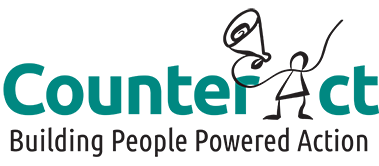What is one thing many activists are really bad at doing?
Asking for money. For ourselves. Sometimes it is easy to ask for other people, for projects we care about it. But essentially I was asking people to support me, with a relatively untested idea.
For me it was incredibly difficult, and of course to add to the challenges – I was in uncharted waters. How do you ask folks to donate money to a project that can be seen as training people to ‘break the law’?
Nonviolent direct action has a long and proud history, both in Australia and overseas, and systematic training and capacity building support for campaigners and the broader community has been integral to its success. I am loving being part of, and supporting this burgeoning movement in this country… but it was certainly a leap of faith to first, establish CounterAct, as my vehicle for this, and then to ask my networks for funds to support the work.
I hoped that people would be receptive, but really had no idea how well it would go, whether people would be interested in funding a relatively amorphous idea of placements at trainings, or whether some would think it was a bad idea.
When I was planning the video and writing the script, I wanted to convey in the video both approachability and professionalism, and also a sense of momentum; a sense of being part of a bigger picture… part of a growing movement in Australia.
I also needed to tell my story. Yikes.
The filming was torture. We spent a day with me in various levels of squirming discomfort being filmed from 4 different angles. I couldn’t remember the lines (alas, the teachers were right when they didn’t give me a place in drama school). At some point there was a couple of drinks involved to finish the whole thing off.
Then there were the multiple edits across international time zones. But in the end it all came together well.
Whilst I benefited from a professional video, which was particularly useful when talking about a confronting issue such as nonviolent direct action, I imagine that this is not necessary for many projects.
Here are some stats from mine:
- 25% of funders were unknown to me
- 35% were mates or acquaintances, people I have worked with, trained, supported in their campaigns; and
- 40% were friends … old school mates, long time friends, and close activist friends
for a total of 161 donors, $12465 donations, and subsequent to the campaign, $2500 more in additional donors that missed out for a final result: $15 000 total of my ‘ambitious’ $17 160 goal.
- 2 x $1000 donations, 1 x $600, 6 x $250
- The rest were small donations with 59 donors under $50
- The average donation $77
What I learnt
- I could have been more ambitious and could have made my target if I had tried just that little bit harder.
- The tipping point goal was a good mid way option for an untested idea
- My instinct towards less generous rewards was right – people wanted to support the work generally, and a decent number have indicated that they are happy for donations to go towards a general pool of capacity building work
- Framing the project as a specific training program, which was essentially supporting my desire to provide ongoing training worked well, whilst still being honest
- People mainly don’t mind you asking. Whilst I’m sure a few friends got sick of seeing my face (as I did), many more became champions for me and a few were wonderfully consistent at reporting my progress and advocating for me
- My social media networks, (1000 facebook, 500 Counteract twitter, 900 personal twitter) whilst not extensive, were certainly useful, as were friends with higher profiles and followings that advocated for me
- It is a lot of work, and large and consistent effort to maintain contact, thanks, and momentum over 6 weeks with donors
- I was able to tap into a genuine sense of good will – from many years of voluntary and low paid activist or campaigning work across a range of sectors
- It was a great community building exercise – lots more people now feel connected and engaged with my work
Things I could have done better
- More direct and personal contact. Whilst I found one on one contact via simple facebook message and email was useful, I didn’t follow up as well as I could have. I also could have personalised my approach more relating to different campaigns and issues I’ve worked on in the past
- Follow up. I am still actually following people up from their original donation as some folks didn’t get to me so there has been a lag time which I could have improved on.
- The professional video was good, but should have been shorter with a tighter script
- I could have deliberately recruited ‘champions’ to ask for me, and promote amongst ‘not your usual suspect’ type of networks, used radio, other friends networks and other creative promotional activities, including more update videos
- Could have been more ambitious. Was repetitive, but shy about aiming for the big goal
- Never miss an opportunity to make an ask!
And my key lesson: get the hell over yourself to do this. If you do good work, with good intentions, most people don’t mind you asking.

